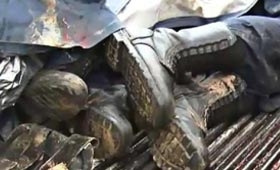The recent killing of 12 policemen in Guerrero, and a car bomb in Tamaulipas, serve as illustrations of the threat of large-scale violence posed by Mexico’s drug trafficking organizations.
On Sunday, a police patrol in Guerrero state, south Mexico, was ambushed outside the town of Teloloapan, in the Tierra Caliente region. The attack came shortly after 10 severed heads, seven men and three women, were found in the town. Twelve police — six state officers and six local — were killed in the attack and 11 others were wounded (see photo, above).
In a separate incident, a car bomb exploded outside the offices of a newspaper in Ciudad Victoria, the capital of the northern state of Tamaulipas, on Monday night. According to officials, no one was harmed, and the bomb caused only minor damage to nearby buildings. The motives for the bombing remain unclear, though the newspaper, the Expreso, is the most widely-read paper in the city.
InSight Crime Analysis
It is not clear whether the two attacks in Guerrero are linked, although state officials have said they believe they are. A note left by the decapitated heads said “this will keep happening to those who continue supporting the ‘FM,’” which presumably stands for the Familia Michoacana. The drug gang is highly active in the region of the state, known as “Tierra Caliente,” and is currently battling for control with a splinter group known as the Caballeros Templarios.
While the Caballeros seem to be the most likely suspects behind both the attack and the beheadings, the note was signed by a group calling itself “Guerreros Unidos,” which state officials have said is actually an alliance of Zetas and Familia members.
Although the government claims that the 90 percent of people killed in Mexico’s bloody “drug war” are affiliated with organized crime, these incidents offer an alarming illustration of the threat that Mexico’s drug trafficking organizations pose to all levels of Mexican society.
Indeed, the use of tactics such as ambushes and car bombs would seem to lend credence to claims that the country’s security situation increasingly resembles Colombia’s struggles with insurgencies. When the Juarez Cartel detonated a car bomb in an attack on local police in July 2010, it was the first time that a cartel had used explosives to target security forces in the country. However, while it is true that politicians are being targeted with more frequency in Mexico, the drug war in Mexico remains criminal, and not ideological in nature.

